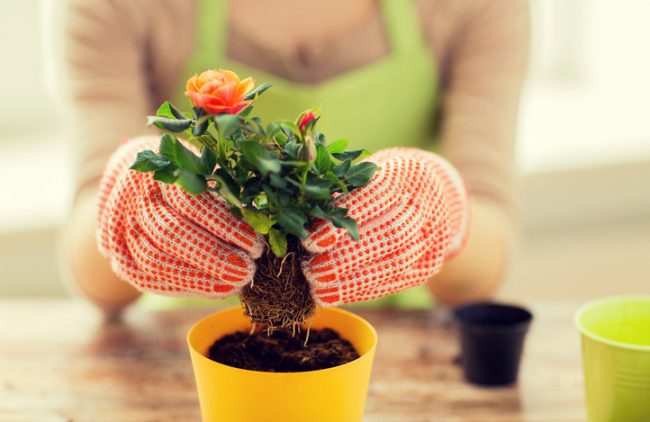Few things provide as much soul-sustenance as a walk on the beach, a hike in the woods or a stroll through a garden. The combination of nature and fresh air invigorates and restores, leaving most of us with a sense of pleasure and expansiveness that no device, material trapping or award- winning film can offer.
But to actually dig down into Earth—in other words, to garden—might be more beneficial for our brains than we once thought. Here’s how the act of nourishing the land can also nourish your mental health—and promote peace and happiness:
1. It fosters mindfulness
Tranquility, awareness, presence—if you’ve ever practiced mindfulness, you’re familiar with its widespread benefits. Rooted in Buddhist tradition, it is, in the words of the Mayo Clinic, “the practice of purposefully focusing our attention on the awareness of the present moment as it relates to our thoughts, feelings, sensations in our body and our sense of the environment around us.”
While seated and guided meditations can be a boon for our health, with the Mayo Clinic reporting that it encourages emotional regulation, relaxation, empathy and understanding for others, memory and cognitive agility, the inherent act of gardening compels us into these states. Concentrating on what’s in front of us, whether it’s a strawberry plant in its infant stages or a zinnia needing water, forces us to slow down, become cognizant of our surroundings, pay attention to minutia, connect to the present moment—and engage completely with the immediate activity.
“Trite as it may sound,” gardener and author Tom Smart writes, “I feel as if all the individual threads of my mind are woven properly together by the act of gardening…if mindfulness means being fully aware of the world around you, fully engaged with your senses, then I can think of no better task than gardening to become more mindful, for what keen gardener has not closed their eyes and bent down to inhale the gentle fragrance of a flower?”
2. It forces you to break away from electronic devices
An iPad in the bedroom, a flat-screen TV in the den, a smart phone perpetually in your pocket—is it any wonder that most of us in our modern world experience high levels of stress? (Indeed, a study out of the University of Gothenburg, Sweden showed that avid users of technology had “increased stress, sleep disorders and depressive symptoms.”) Gardening, however, urges you outdoors and away from the text messages, email alerts, social media updates and 24/7-news that tend to consume us.
3. It provides positive sensory stimulation
Speaking of devices: many people derive stimulation from their electronics, whether it’s watching a video on their phone or scrolling through their Facebook feed for something politically provocative. But beyond the rather obvious symptoms of electronic fatigue—from blurry eyes and a lack of exercise to compromised sleep—there’s the notion that monotonous, one-note stimulation (such as staring at a screen) can deprive one’s spirit. To wit: Researchers out of NASA found that gardening kept astronauts happier and more mentally sound.
“In space, there is no scent of baking bread, no wind on your face, no sound of raindrops hitting the roof, no favorite kitten to curl up in your lap,” Science Daily writes. “Over time, being deprived of these common earthbound sense stimulations takes a toll”—so much so NASA considers limited sensory stimulus a significant health risk. However, nurturing flowers and plants, their researchers found, improved isolation, loneliness and stress.
4. It may encourage sounder, deeper sleep
Even without a speck of research in front of us, we intuitively know that contentment depends in large part on our sleep health. Deprived of rest, and simple stresses can overwhelm us—rendering us irritable, moody and anxious—while taking pleasure in all that life has to over feels, well, tiring.
If you’re one of the many who suffers from inadequate sleep or straight-up insomnia, consider reaching for those gardening gloves: Research published by the National Institutes of Health reveals that activities like weeding and growing your own vegetables can promote sleep (and reduce pain), citing the power of “direct physical contact” with Earth’s vast supply of health-boosting electrons.
5. It cultivates intention
Creating and maintaining a garden requires strategy—and intention—impelling you to not only consider the seasons but also your soil, your environment, and the seeds you want to sow. The metaphors for this in life outside of your garden are rich, hammering home the Vedic declaration that “you are what your deepest desire is. As your desire is, so is your intention. As your intention is, so is your will. As your will is, so is your deed. As your deed is, so is your destiny.”
6. …and spurs creativity and problem-solving
Unless you’re a landscape artist hired for a job, chances are you can design your garden—whether that be flowers or herbs—to your liking (keeping in mind, of course, essentials like water, light, nutrients and soil). Such planning inspires a sense of playfulness as you work with Mother Earth’s raw materials—and with that may come increased creativity in your everyday life, as well as a stronger ability to problem-solve.
After all, gardening demands us to think through the life of a plant, devise possible solutions to issues like pests, and imagine possibilities. Which is really what drives us and makes us happy, isn’t it?




